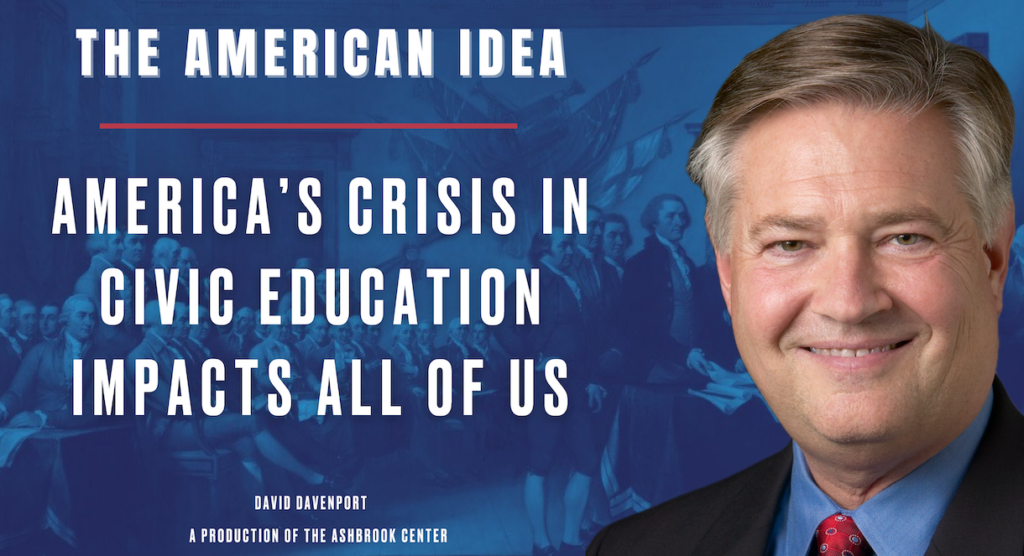The Crisis in Civics Education Impacts All of Us
August 7, 2024

Listen and subscribe to the podcast
Join The American Idea’s Listener Email list – get news about upcoming episodes and a chance to offer questions for them, too!
Get a copy of Jeff and David’s book, A Republic, if We Can Teach It, on Amazon.
Read an objective review of the book, from the Russell Kirk Center.
Understanding America’s Civic Education Crisis
In recent decades, America’s civic education has faced a profound crisis, jeopardizing the foundational knowledge and engagement vital to a healthy democracy. Once central to public education, civic education has steadily eroded, overshadowed by priorities such as STEM subjects and standardized testing.
Historically, civic education was paramount in shaping informed citizenship and understanding democratic principles. However, as the nation prioritized subjects perceived as essential for economic competitiveness, such as science and technology, the emphasis on civics waned.
Over time, the hours dedicated to teaching civics diminished significantly, particularly in elementary and middle schools. Today, most high schools offer only a superficial semester-long course, inadequate for fostering a deep comprehension of civic responsibilities.
Emergencies like the space race and international test rankings further marginalized humanities and social sciences, exacerbating the decline in civic education.
Consequences of Inadequate Civic Education
Recent assessments, like the NAEP test, highlight alarming gaps in civic knowledge among American students. A significant portion lack proficiency in understanding government functions and historical context, with scores showing a steady decline.
The deficiency in civic education correlates with diminishing rates of civic engagement among youth, including participation in voting and community activities. This disengagement poses a threat to the bedrock of democracy.
Moreover, inadequate civic education contributes to widespread distrust in governmental institutions and a diminished sense of national pride among younger generations.
Proposed Solutions and Challenges
Advocates propose action civics—active participation in civic activities—as an alternative to traditional classroom learning. Critics caution that while practical, this approach risks prioritizing engagement over foundational knowledge.
Alternative narratives, exemplified by projects like the 1619 Project, seek to reframe American history through marginalized perspectives. Critics argue these narratives oversimplify complex historical realities and undermine traditional civic values.
Efforts to reform civic education focus on reinstating comprehensive civics curricula that emphasize critical thinking, primary source analysis, and an understanding of constitutional principles. Organizations like the Ashbrook Center advocate for teaching the “why” of American principles to foster informed patriotism and civic responsibility.
The Power of Primary Sources
Recent seminars underscore the transformative power of primary documents in civic education. Educators, exploring speeches from Hoover and Roosevelt alongside legislative texts and court decisions, discovered nuanced narratives absent in textbooks.
These sessions emphasized the importance of fostering open-mindedness and critical thinking. Teachers, initially skeptical or entrenched, embraced the intellectual challenge posed by primary sources, promoting objectivity and deeper engagement.
A significant hurdle lies in the preparation of educators, many of whom lack adequate content knowledge. Current teacher training programs prioritize pedagogy over historical depth and critical analysis, highlighting an urgent need for reform.
Policy Imperatives for Civic Education
Effective reform requires state legislatures and school boards to mandate robust civics education from early grades through high school. A layered approach ensures progressive learning from basic narratives to nuanced historical analysis.
Community Involvement and Resources
Building effective civic education also relies on community involvement and accessible resources. Initiatives like the Civic Bee and primary source-based curricula complement formal education, enriching student engagement.
Despite challenges, optimism exists for the future of civic education. Reform efforts, focused on local and state-level changes, empower communities and educators to shape an informed citizenry through incremental improvements.
Conclusion
The crisis in American civic education demands urgent reform to restore comprehensive learning and engagement. By leveraging primary sources, enhancing educator training, and enacting thoughtful policy reforms, we can ensure civic education fulfills its critical role in shaping the future of democracy.

